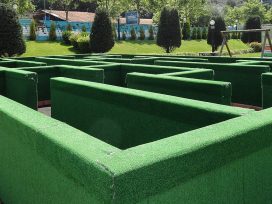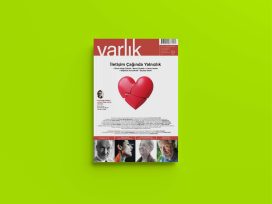On this side of the barbed wire
- Eurozine Review
3/2017
‘Merkur’ responds to Europe’s detractors; ‘Vikerkaar’ discusses what is to be done; ‘L’Homme’ examines dissident anti-feminism; ‘Arena’ asks what happened to Swedish sin; ‘Varlık’ uncovers post-truth complicities; ‘Index’ reports on consensus and dissent in Turkey; ‘NAQD’ debates fiction’s role in terror and memory; and ‘Wespennest’ re-familiarizes itself with the concept of alienation.
Merkur (Germany) 5/2017
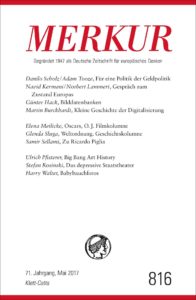
‘While the state of today’s European integration process can be criticized for many things, it certainly can’t be said to be characterized by a loss of democratic legitimacy. On the contrary, never before has there been comparable degree of influence by the European parliament on every act of European law.’
In Merkur, Norbert Lammert, the Christian Democrat President of the German parliament, responds to the EU’s nationalist detractors from both ends of the political spectrum. The centrifugal forces threatening European unity can only be countered by investing the Union with more powers, Lammert argues. National governments blame the EU for the problems brought by globalization, instead of enabling it to introduce ‘structural transformations’ and a ‘mechanism of re-distribution’.
Leftwing nationalism: In his book How Will Capitalism End? Wolfgang Streeck has argued that the de-politicization of economics has led to a technocratic regime within the EU, best seen in the handling of the Eurocisis. The response must be less, not more universalism. But is technocracy really antithetical to democracy?
Historians Adam Tooze and Danilo Scholz argue that it is precisely the European Central bank, for Streeck the epicentre of eurocapitalism, that can protect democracy in Europe. They cite Mario Draghi’s assurance before the Italian referendum on constitutional reform that the result would not influence the bank’s policy towards buying Italian bonds, thus ensuring the referendum was fought on its own terms.
‘It would be a severe theoretical error and a missed political opportunity to see technocratic structures as a form of political atrophy,’ they write. ‘The central question, already raised by the generation of Keynes and Kojève, is whether, in Europe, technocratic politics can be combined with the élan of an internationalist democracy.’
More articles from Merkur in Eurozine; Merkur’s website
Vikerkaar (Estonia) 4-5/2017
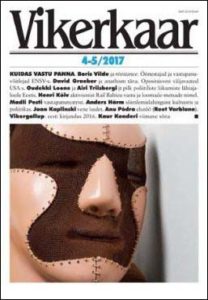
‘Resistance’ is the word of the moment. In the era of disappointment with political elites, grassroots activism increasingly drives political change and rejects decisions made in the chambers of high politics. In its spring double-issue, Vikerkaar looks at resistance, civil disobedience, and protest locally, globally and in history.
Anarchism: Anthropologist, activist and bestselling anarchist David Graeber talks to editor Aro Velmet about the police state, bullshit jobs and why the masses need no telling that capitalism is bad: ‘People don’t like the existing system, they just haven’t yet been convinced that a viable opportunity is out there. They don’t think they would be allowed to create the kinds of institutional structures to create one themselves. I think most people are deeply dissatisfied.’
Trump: Shocked liberals have cast Trump as an ideological novelty appealing to a new electoral majority. This overlooks his conventionality and mistakes rhetoric for reality, argues Michael Kinnucan. Moreover, ‘it is Trump’s very conventionality that has proved his most important weakness so far.’
Civil disobedience: Oudekki Loone and Airi Triisberg trace the role played by radical activists in shaping Estonian policy and discourse in recent decades; and Henri Kõiv looks at efforts to oppose the razing of public forests, the construction of the Rail Baltic rail system, and the movement to ban fur farming in Estonia.
Cultural resistance: Madli Pesti argues that Estonian theatre has shied away from radical, systemic social critique in the past decade, preferring to suggest that ‘change begins with the individual’; and Anders Härm looks at the politics of rap and how the genre has been translated into Estonian culture.
More articles from Vikerkaar in Eurozine; Vikerkaar‘s website
L’Homme (Austria) 1/2017
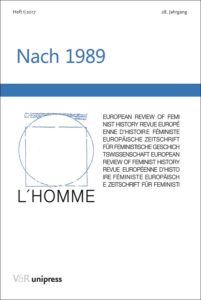
The revolutions of 1989 have widely been seen as a victory for human rights but a setback for the rights of women. Was this a side effect of the universalist premise of human rights, as many have argued?
In L’Homme, historian Robert Brier tests the theory by focusing on the role of women in the dissident movement. While women were active at all levels, he finds, they played an auxiliary role: only eight per cent of the Solidarity leadership was female, although women made up around half of its membership. While the universalism of the dissident movement concealed gender hierarchies, there was no inherent reason why it should not have been applied to women’s rights. Male dissidents saw feminism as an expression of the ideology they were seeking to escape, yet ‘the gender history of state socialism suggests that anti-feminism may have evolved as much out of the system as it was formulated against it’.
‘More than that,’ writes Brier, ‘there even seems to have existed something of an unspoken consensus among the dissidents and their governments regarding gender roles.’ After de-Stalinization, this was that the family was off limits to ideological experimentation. ‘The gender hierarchies characterizing dissidence … were shaped by the very system it rebelled against.’
Gender after 1989: Sociologist Barbara Einhorn on the use of gender as ‘weapon’ in the new illiberalism: ‘In a bitter twist to the practice by which those on the Right borrow, co-opt, or steal the ideas or the political discourse of the Left in order to appeal to the Left’s traditional voters, feminist discourse is now being instrumentalized by ultra-conservative, populist and extreme right-wing politicians in support of nationalistic and authoritarian policies.’
More articles from L’Homme in Eurozine; L’Homme’s website
Arena (Sweden) 2/2017
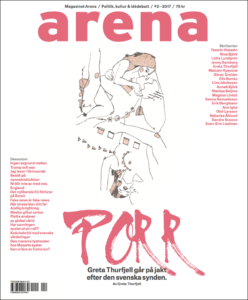
‘I’ve watched a lot of porn,’ writes Greta Thurfjell in Arena (Sweden). ‘But I’ve only seen a single Swedish porn movie. And that was a joke.’
In a reportage mapping the decline of the Swedish porn industry, Thurfjell describes how she grew up having free access to internet porn. Unlike the generations before her, she knows nothing about hidden magazines or VHSs, but lots about the American websites – YouPorn, RedTube, PornHub… And there, Swedish porn is almost non-existent.
In the 1960s things were very different. Sweden was one of the first countries to legalize pornography and the image of a porn star today still has many of the features associated with ‘Swedish sin’ – blond, curious and free of shame.
So, what happened? ‘Is globalization to blame? Or capitalism? Or – perish the thought – feminism?’ No, Thurfjell concludes: the reason is simply that, though it might have been the first, Sweden is not necessarily the best at catering to international desires.
But perhaps there are good reasons to revive Swedish porn production. Studies show that that there is a correlation between a liberal view of pornography and a liberal view of women’s rights. Where pornography is forbidden, there is very often a conservative conception of women’s role in society. ‘Domestic production of porn can be regulated, working conditions can be controlled, and crimes can be dealt with in court. We have no influence on how porn is produced in the US – but the image of Sweden, at home and abroad, is for us to create.’
Can we learn from history? ‘Yes’, says Ord&Bild editor Ann Ighe. ‘I would even go so far as to say that almost all we know about humanity and our societies is historical knowledge. The problem is that from history we mainly learn about history. The future will always remain uncertain.’
More articles from Arena in Eurozine; Arena’s website
Varlik (Turkey) 5/2017
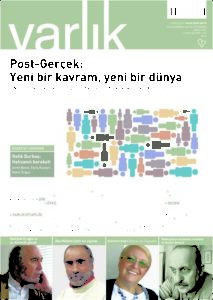
In an issue of Varlık focusing on ‘post-truth’ politics, Nilgün Tutal explores how the new paradigm of political control differs from its totalitarian predecessor. Starting from Triangle, the 1979 performance by Croatian artist Sanja Ivekovic, she shows that under totalitarian regimes ‘the truth’ had the power to threaten the regime. In ‘post-truth societies’, on the other hand, ‘even when the truth emerges, it has lost its power to provoke political scandals’.
The tragedy of post-truth politics is that it asks the public to choose between narratives that burnish national pride and the truth. ‘The post-truth lie differs from the totalitarian lie imposed on the public by the government in that it is based on a kind of agreement between the politicians and the public. This is the new pact signed with the devil.’
Turkey’s failing fourth estate: Turkish journalism has never been a fully-formed fourth estate, writes Kormaz Alemdar: ‘The newspaper here is the legacy of the semi-colonial time of the Ottoman Empire. In order to publish, a system of permissions and censorship was in place.’ In Turkey today, Alemdar sees a sector in which the capacity of professional bodies to resist has been eroded by globalization and monopolization. With journalism classed not as a profession but as an ‘occupation’, ‘we live in a country in which everyone can do journalism, everyone can write for newspapers’ and the criteria for success is what pleases the readership’.
‘The result is an array of writers and commentators whose only goal is to curry favour. These are a ‘new kind of upstart who repeat the “official” view on every debate show they join, cut off those with opposing views, in short try to gain prominence not through what they say, but through how they say it.’
More articles from Varlik in Eurozine; Varlik‘s website
Index on Censorship (UK) Spring 2017
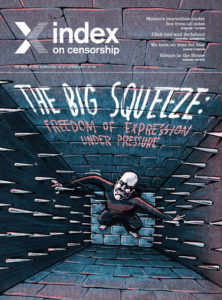
In Index, Turkish journalist Canan Coşkun, a journalist at Cumhuriyet who faces two upcoming trials for her reporting, talks about her attitude to the dangers of life as a reporter in Turkey. Recalling the events of 5 November 2016, when ten of her colleagues were arrested, she writes that ‘among the many feelings I had, fear was not one of them. When the attacks on journalism are on this scale, fear becomes a luxury’.
Self-censorship: After the Gezi Park uprising, the idea that the Turkish nation can survive only through consensus between westernizers and traditionalists no longer dominates, writes novelist and journalist Kaya Genç. Despite the post-putsch crackdown, dissent continues to be voiced by those willing to brave the possible consequences. ‘Their ideas challenge the traditional view of Turkey as a nation that can only survive through consensus.’
Politics and offence: Afraid to cause offence, political messaging in the UK attempts to ingratiate itself with its audience, writes former attorney general and prominent pro-European Conservative MP Dominic Grieve. Above all on immigration, mainstream politicians have shied from engaging with the public. The lack of ‘reasoned examination of the underlying drivers’ meant that, when immigration became the key topic in the Brexit debate, the Remain camp found itself ‘incapable of responding’.
More articles from Index on Censorship in Eurozine; Index on Censorship’s website
NAQD (Algeria) 33-34/2017
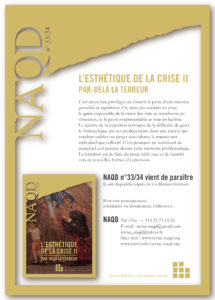
NAQD devotes an issue to the aesthetics of terror. Writing on ‘deadly fiction and the aesthetization of death’, historian and art theorist Soko Phay discusses the manipulation of truth by the perpetrators of genocide. Even without the services of a Leni Riefenstahl, Pol Pot’s acolytes used cinema to promote their vision of ultimate submission to the Khmer Rouge, seeking to efface all memory of what had been. There is next to no trace of the genocide in the surviving film: the slogan was ‘see nothing, hear nothing, know nothing, understand nothing – obey without asking questions’.
A discussion follows, taking up the theme of ‘double obliteration’, both of people and material proof. Particularly for the next generation, it is crucial to find ways to rebuild memory, argues Phay. Fictional images ‘cannot replace evidence and objects that have been lost, but they give an insight into historic events which these young people did not experience’. A new cinematic culture is emerging, but ‘fiction can only come with considerable detachment, having made a degree of peace with the past’.
Art as sublimation: Sculptor Fethi Hadj Kacem discusses his work ‘The Labyrinth’, cast in the shape of a map of Algeria. He took inspiration as an adolescent in the 1990s from the rise of the Islamic movement, when ‘people seemed to have entered a never-ending spiral’. At its nadir in the 1990s, ‘people were told that Islam is the only path to salvation, but they did not want to take it, and ended up going back into the labyrinth’.
More articles from NAQD in Eurozine; NAQD’s website
Wespennest (Austria) 172/2017
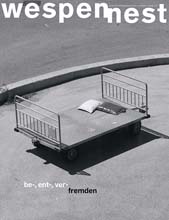
‘Longing for a time and confusing it with a place. Missing youth, childhood, the womb, mistaking it for a country, a nation. Becoming more nationalist than those left behind.’
In Wespennest, Claudia Ciobanu writes on the dilemmas of the ‘voluntary migrant’ in the European Union, in her case as a Romanian living in Poland. A political activist, she tries but fails to re-create the sense of solidarity experienced back home amongst her generation of protesters, and begins to doubt the strength of her own convictions. Observing the rise of the Right in Poland, she finds herself sympathizing with the ‘losers of transition’ while feeling targeted by their xenophobia. And hearing people’s indifference to the plight of the refugees, she battles with a sense of futility:
‘For once, it mattered little where I was from. As long as I was on this side of the barbed wire that kept out people fleeing war. It was as if the notoriously elusive European identity had finally come into existence, but as a nightmarish vision, not the one dreamed of by the architects of the EU.’
Alienation: Philosopher Rahel Jaeggi on why the Marxian concept of Entfremdung, stripped of its paternalism and essentialism, remains useful: alienation as ‘loss of freedom’, overcome not through ‘reconciliation’ with the world but ‘appropriation’. And sociologists Otto Penz and Birgit Sauer on the effects of the privatization of the Austrian postal service on its employees: insecurity and stress brought by savings and productivity measures, burn-out and alienation as marketing becomes top priority.
More articles from Wespennest in Eurozine; Wespennest’s website
The Eurozine Review presents a selection of the latest issues of Eurozine partner journals, summarizing their contents in English as a way of encouraging cultural and political dialogue between national public spheres in Europe.

Published 15 May 2017
Original in English
First published by Eurozine
© Eurozine
PDF/PRINTNewsletter
Subscribe to know what’s worth thinking about.


